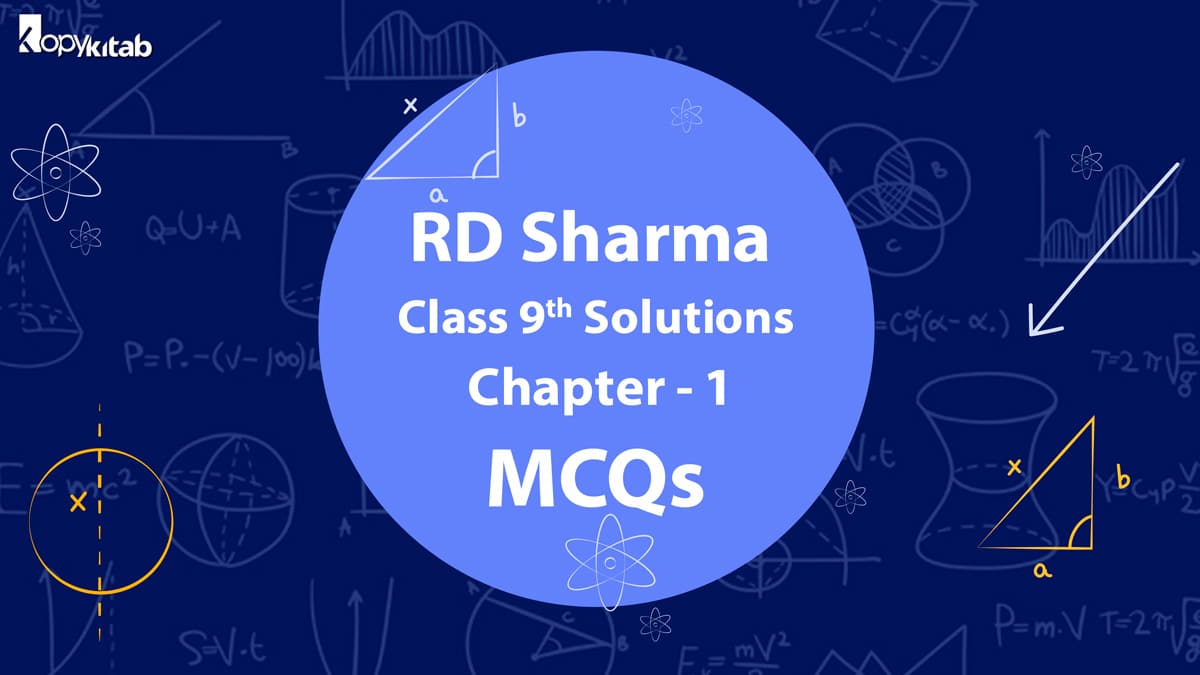
RD Sharma Class 9 Solutions Chapter 1 MCQS: Class 9 Maths exams are made easier. All thanks to the RD Sharma Solutions Class 9 Maths. Be it your exams or class assignments, we have got your back! Download the Free PDF of RD Sharma Class 9 Solutions Chapter 1 MCQs from this blog. To now more, you can read the whole blog.
Access answers of RD Sharma Class 9 Solutions Chapter 1 MCQS
1.) Can we write 0 in the form of p/q?
a. Yes
b. No
c. Cannot be explained
d. None of the above
Answer: a
Explanation: 0 is a rational number and hence it can be written in the form of p/q.
Example: 0/4 = 0
2.) The three rational numbers between 3 and 4 are:
a. 5/2, 6/2, 7/2
b. 13/4, 14/4, 15/4
c. 12/7, 13/7, 14/7
d.11/4, 12/4, 13/4
Answer: b
Explanation: There are many rational numbers between 3 and 4
To find 3 rational numbers, we need to multiply and divide both the numbers by 3+1 = 4
Hence, 3 x (4/4) = 12/4 and 4 x (4/4) = 16/4
Thus, three rational numbers between 12/4 and 16/4 are 13/4, 14/4 and 15/4.
3.) In between any two numbers, there are:
a. Only one rational number
b. Two rational numbers
c. Infinite rational numbers
d. No rational number
Answer: c
Explanation: Take the reference from question number 2 explained above.
4.) Every rational number is:
a. Whole number
b. Natural number
c. Integer
d. Real number
Answer: d
5.) √9 is __________ number.
a. A rational
b. An irrational
c. Neither rational nor irrational
d. None of the above
Answer: a
Explanation: √9 = 3
Hence, √9 is a rational number.
6.) Which of the following is an irrational number?
a. √16
b. √(12/3)
c. √12
d. √100
Answer: c
Explanation: √12 cannot be simplified to a rational number.
7.) 3√6 + 4√6 is equal to:
a. 6√6
b. 7√6
c. 4√12
d. 7√12
Answer: b
Explanation: 3√6 + 4√6 = (3 + 4)√6 = 7√6
8.) √6 x √27 is equal to:
a. 9√2
b. 3√3
c. 2√2
d. 9√3
Answer: a
Explanation: √6 x √27 = √(6 x 27) = √(2 x 3 x 3 x 3 x 3) = (3 x 3)√2 = 9√2
9.) Which of the following is equal to x3?
a. x6 – x3
b. x6.x3
c. x6/x3
d. (x6)3
Answer: c
Explanation: x6/x3 = x6 – 3 = x3
10.) Which of the following is an irrational number?
a. √23
b. √225
c. 0.3796
d. 7.478478
Answer: a
Explanation: √23 = 4.79583152331…
Since the decimal expansion of the number is non-terminating non-recurring. Hence, it is an irrational number.
11.) Which of the following is an irrational number?
a. 0.14
b. 0.1416¯
c. 0.1416¯
d. 0.4014001400014…
Answer: d
Explanation: 0.4014001400014…is an irrational number as it is non-terminating and non-repeating.
12.) 2√3+√3 =
a. 6
b. 2√6
c. 3√3
d. 4√6
Answer: c
Explanation: 2√3+√3 = (2+1)√3= 3√3.
13.) Find the value of 2−12+1, if √2 = 1.4142.
a. 5.8282
b. 0.1718
c. 0.4142
d. 2.4142
Answer: c
Explanation:
2−12+1 = 1.4142−11.4142+1
=0.41422.4142
= 0.4142
14.) The number obtained on rationalising the denominator of 17−2 is
a. (√7+2)/3
b. (√7-2)/3
c. (√7+2)/5
d. (√7+2)/45
Answer: a
Explanation:
17−2=17−2×7+27+2=7+2(7)2−(2)2=7+23
15.) Which of the following is rational?
a. 4/0
b. 0/4
c. √3
d. π
Answer: b
Explanation: 0/4 is a rational number that is equal to 0. Whereas π and √3 are irrational numbers and 4/0 is meaningless.
16.) The irrational number between 2 and 2.5 is
a. √11
b. √5
c. √22.5
d. √12.5
Answer: b
Explanation: The irrational number between 2 and 2.5 is √5 because the approximate value of √5 is 2. 23606…
17.) The value of √10 times √15 is equal to
a. 5√6
b. √25
c. 10√5
d. √5
Answer: a
Explanation: √10×√15 =(√2.√5)×(√3. √5) = 5√6.
18.) The decimal representation of the rational number is
a. Always terminating
b. Either terminating or repeating
c. Either terminating or non-repeating
d. Neither terminating nor repeating
Answer: b
Explanation: As per the definition of rational number, its decimal representation is either terminating or repeating.
19.) Which of the following is a rational number?
a. 0
b. 2√3
c. 2+√3
d. π
Answer: a
Explanation: 0 is a rational number, and it can be written as 0/1 or 0/2 or 0/3 etc. Whereas 2√3, 2+√3, and π are irrational numbers.
20.) Which of the following is an irrational number?
a. √(4/9)
b. √12/√3
c. √7
d. √81
Answer: c
Explanation: √7 is an irrational number. Because other options given are simplified into a rational number.
This is the complete blog on RD Sharma Solutions Class 9 Maths Chapter 1 MCQs. To know more about the CBSE Class 9 Maths exam, ask in the comments.
FAQs on RD Sharma Solutions Class 9 Maths Chapter 1 MCQs
How much does it cost to download the PDF of RD Sharma Solutions for Class 9 Maths Chapter 1MCQs?
You can download it for free.
Can I access the RD Sharma Solutions Class 9 Maths Chapter 1 MCQs PDF offline?
Once you have downloaded the PDF online, you can access it offline as well.
Are the solutions RD Sharma Solutions Class 9 Maths Chapter 1 MCQs relevant?
The solutions are relevant as they are designed by the subject matter experts.
